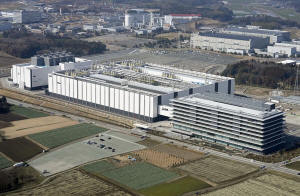|
Japan considers new legislation to back
advanced chipmaking
 Send a link to a friend
Send a link to a friend
[June 04, 2024]
TOKYO (Reuters) - Japan plans to look into legislation to support
the commercial production of advanced semiconductors, a draft of this
year's long-term economic policy plan seen by Reuters shows.
The long-term roadmap, which is crafted each year as a key document
highlighting the administration's policy priorities, is expected to be
finalized around June 21. |

An aerial view shows the semiconductor plant by Japan Advanced
Semiconductor Manufacturing Company (JASM), a subsidiary of Taiwan
Semiconductor Manufacturing Company (TSMC), in Kikuyo town, Kumamoto
prefecture, southwestern Japan February 12, 2024, in this photo taken by
Kyodo. Mandatory credit Kyodo via REUTERS/File Photo |
|
"In
order to strengthen the chip supply chain, we will promote
domestic production sites, human resources, research and
development in cooperation with countries and regions with the
same objectives," the draft said.
"In particular, we will consider necessary legislative measures
for the mass production of next-generation semiconductors," it
added.
It did not mention any specific chipmaker.
Last week, the industry ministry said Japan would need a new
regulatory framework to help chip foundry venture Rapidus start
mass production of cutting-edge chips from 2027.
As Tokyo pushes forward with plans to rebuild the country's chip
manufacturing base, it has agreed to provide up to 920 billion
yen ($5.94 billion) in subsidies to Rapidus.
But the subsidies are for research and development, and Japan
would need a new framework such as government guarantees to help
attract funds from investors and financial institutions to
finance mass production, a government source has said.
Rapidus is headed by industry veterans and is targeting mass
production on the northern island of Hokkaido in partnership
with IBM and Belgium-based research organization Imec.
($1 = 154.8400 yen)
(Reporting by Takaya Yamaguchi, Ritsuko Shimizu; Writing by
Kantaro Komiya and Makiko Yamazaki; Editing by Andrew Heavens
and Alexander Smith)
[© 2024 Thomson Reuters. All rights
reserved.]
This material may not be published,
broadcast, rewritten or redistributed.
Thompson Reuters is solely responsible for this content.

|
|
|




